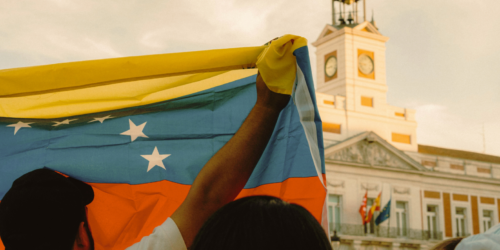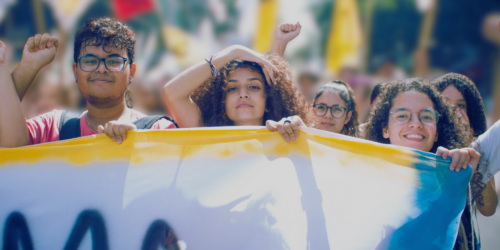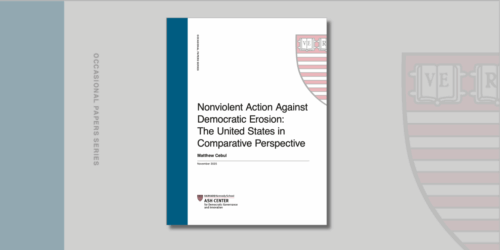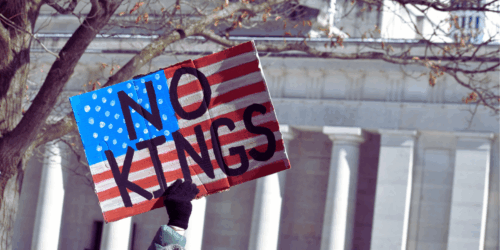
Commentary
How Maduro’s Dictatorship Plans to Survive
Even with Nicolás Maduro gone, the fight for Venezuela’s future is far from over. Freddy Guevara warns that Maduro’s successors are more interested in regime survival than democratic reform.
Commentary
In May 2021, opposition to Israeli occupation and the displacement of Palestinians set off a large wave of pro-Palestinian protest activity in the United States. The initial protests were especially motivated by the Israeli push to remove Palestinian families who live in East Jerusalem’s Sheikh Jarrah neighborhood and replace them with Israeli Jews, but other factors contributed as well. During this period, the Crowd Counting Consortium has logged more than 460 events in the United States in support of Palestine with more than 130,000 total participants, and, more than a month later, the movement continues to unfold and evolve.
While protests against expulsions from Sheikh Jarrah had already occurred in Israel and Palestine, the first 2021 event captured in CCC’s dataset that specifically mentions “the current violence against Palestinians in Jerusalem” occurred in Boston’s Copley Square on May 1. One week later, Palestinian-led groups organized demonstrations in Brooklyn and Chicago to condemn Israeli actions and support Palestinian resistance in Sheikh Jarrah.
Over the next several days, various pro-Palestinian organizations organized a series of “emergency” actions across the U.S. to decry the expulsions from Sheikh Jarrah and aggressive Israeli police actions in the al-Aqsa Mosque. As the charts below show, on Saturday, May 15, roughly 60 events nationwide drew tens of thousands of participants, and nearly as many turned out for a smaller number of events the next day. That peak weekend included massive marches in Washington, D.C., and Los Angeles on Saturday and in Chicago and Dearborn, Michigan, on Sunday. The Chicago and L.A. marches both reportedly drew 20,000 or more, while high estimates for the D.C. and Dearborn events put turnout around 10,000 each. These are some of the largest political crowds CCC has seen in the United States in 2021 so far.
As of June 10, CCC had recorded events associated with this wave in 250 unique cities and towns. The geographic scope of the groundswell of recent activism in support of Palestine is also evident in the animated map below.
At many of these events, organizers and participants harshly condemned Israeli practices, using words such as ethnic cleansing, atrocities, genocide, and apartheid. Recent reports from Human Rights Watch and from B’Tselem, an Israeli human rights organization, characterizing the Israeli system as apartheid have brought renewed attention to that wording. But it has long been the Palestinian contention that the Israeli system meets the international definition of apartheid. Moreover, organizers from Black Lives Matter–associated groups have used such messaging fairly consistently since at least 2016.
Indeed, at some events, anti-racist and abolitionist organizations and pro-Palestine demonstrators have expressed solidarity with one another, emphasizing related experiences with settler colonialism, white supremacy, and police brutality. The chant “From Ferguson to Palestine,” which existed prior to this protest wave, speaks to the ways in which many contemporary activists draw on Black radical traditions to articulate common cause between Palestinian and Black liberation struggles. Solidarity protests along these lines took place in Dearborn, Greenville, Portland, New York, L.A., and elsewhere.
Sometimes the protests have explicitly challenged U.S. policy that favors Israel over Palestine. At numerous actions, protestors called for ending U.S. aid for Israel, about $3.8 billion annually. Pro-Palestine protesters have recently demonstrated at the offices of members of the U.S. Congress, at the U.S. State Department, and at the headquarters of corporations like Boeing, Raytheon, and Gulfstream. In the first few weeks of the current wave, several actions were held outside Israeli consular offices in places like Los Angeles and New York. In June, demonstrators in several cities have gathered to prevent Israel-flagged ships from off-loading cargo in U.S. ports.
A wave of mobilization in support of Israel has also occurred during this same period, but it has been much smaller. So far, CCC has recorded 57 explicitly pro-Israel events since May 1, 2021, with 10,000-15,000 total participants across 46 different cities and towns. The first third of those events all occurred on Wednesday, May 12, when the Israeli-American Council collaborated with local groups to organize rallies in 19 cities under the slogan “Stand Up Against Terror, Stand with Israel.” The early phase of these waves also saw a number of direct counter-protests and some physical clashes between pro-Palestinian and pro-Israeli demonstrators.
As antisemitic attacks in the U.S. accelerated, the Israeli-American Council coordinated a second batch of rallies on Sunday, May 23, that emphasized opposition to antisemitism in addition to support for Israel. The single-largest in-person pro-Israel rally during this period took place in Cedarhurst, New York, on May 27 when an estimated 3,500 to 4,000 people came to a local park “to show support for Israel and Jewish people around the world.” A number of leading American Jewish organizations had declared May 27 a national Day of Action Against Antisemitism, and a virtual rally held that same day drew faith leaders and top lawmakers from across the country.
Among other things, these protests supporting Israel or Palestine serve as a reminder of how sensitive the protest environment is to current events. From January through April 2021, CCC tallied only two protests in the United States in support of Palestine and none in support of Israel.
In our research thus far, we did not try to disentangle the various aspects of Israel-Palestine to ascertain exactly which sub-claims were the most important. The Sheikh Jarrah displacement, heavy-handed Israeli police actions in Jerusalem’s al-Aqsa Mosque, Israel not allowing Palestinians to congregate at the Damascus Gate in Jerusalem’s Old City during Ramadan, the IDF bombing of Gaza, and Israeli Jewish citizens attacking 1) Palestinians in Jerusalem and 2) Palestinian citizens of Israel inside pre-1967 Israel (e.g., in Lod, Haifa, Jaffa) all could affect the organization of, and participation in, pro-Palestine events. Each of these sub-claims reinforces certain aspects of a larger Palestinian narrative about Israeli occupation, settlements, and apartheid; Palestinian dispossession; and the need for Palestinian rights and/or statehood. While the exact sub-claims would vary, the same connection between specific issues and a larger narrative is happening among U.S. groups and protesters supportive of the Israeli government.
Commentary
Even with Nicolás Maduro gone, the fight for Venezuela’s future is far from over. Freddy Guevara warns that Maduro’s successors are more interested in regime survival than democratic reform.
Policy Brief
Erica Chenoweth and Matthew Cebul analyze the global surge of Gen Z-led protest movements, showing how economic insecurity, exclusion from power, and corruption are driving youth mobilization worldwide.
Occasional Paper
In this report, Matthew Cebul, Lead Research Fellow for the Nonviolent Action Lab, examines the effectiveness of nonviolent action movements in supporting democratic resilience globally. Identifying challenges faced by nonviolent pro-democracy movements, Cebul offers key takeaways for combating accelerating democratic erosion in the US and abroad.
Policy Brief
Erica Chenoweth and Matthew Cebul analyze the global surge of Gen Z-led protest movements, showing how economic insecurity, exclusion from power, and corruption are driving youth mobilization worldwide.
Occasional Paper
In this report, Matthew Cebul, Lead Research Fellow for the Nonviolent Action Lab, examines the effectiveness of nonviolent action movements in supporting democratic resilience globally. Identifying challenges faced by nonviolent pro-democracy movements, Cebul offers key takeaways for combating accelerating democratic erosion in the US and abroad.
Article
In this op-ed, Liz McKenna examines the second ‘No Kings’ protest on October 18 and offers strategies for translating successful protest movements into influential policy change. She emphasizes the importance of sustained organizational efforts alongside protest activity to engage actors across partisan lines, building a broad coalition and a durable base for the movement.


